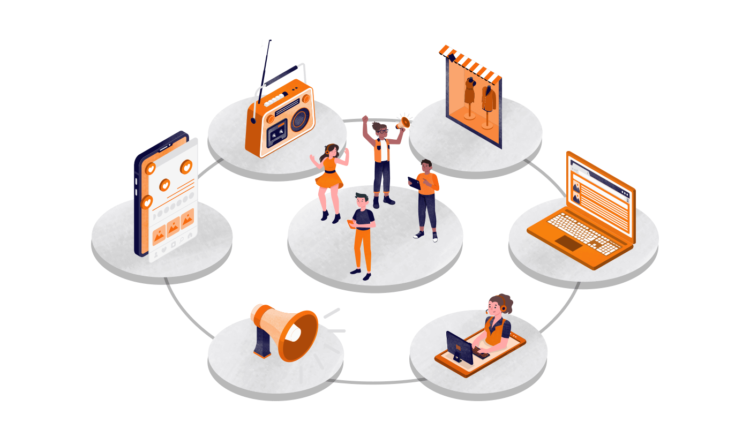In the fast-changing world of digital technology, customers want more than products or services – they look for experiences. They seek smooth dealings with companies at different places. For example, on the internet, in physical shops, or using social media platforms. The need for this has led to the creation of what we call omnichannel marketing. It is a plan that uses all possible ways of communication to give customers a smooth and same experience. And the best part is that it is independent of where they are. In our writing here, we look at why it’s important to use omnichannel marketing. We delve into how it helps companies give an uninterrupted brand feeling.
Understanding Omnichannel Marketing
Omnichannel marketing means not only being on many platforms but also ensuring the customers’ experience is seamless no matter which way they interact with a company. Different from multichannel marketing where each platform works separately, omnichannel marketing aims to remove these divisions and provide a unified customer journey. When a customer is looking around on a website, coming to an actual shop, or talking on social media platforms, they must come across the same information, brand image and quality of service.
The Importance of Seamless Integration
A main part of omnichannel marketing is to integrate smoothly. It means linking different channels and making sure they operate as one to give a consistent experience. A customer can begin a transaction on one platform and finish it on a different one without problems. This needs strong systems behind the scenes and technology that can update information immediately. Thus, making sure there’s no trouble when switching between platforms.
Omnichannel marketing focuses on being present where the customers are and serving their likes. Providing various places for interaction, companies can boost customer happiness and faithfulness. Through custom emails, engaging posts on social networks, or unique experiences in the shop, omnichannel marketing helps brands to build significant relationships with their audience at all parts of the purchasing process.
Data-Driven Insights and Building Brand Consistency
Omnichannel marketing is very beneficial because it creates a lot of data. When companies watch how customers act across different channels, they can learn important things about what the customers like, how they behave, and the way they buy things. The information gathered can help improve marketing plans, make messages more personal and predict what customers will need next. By studying how people look at things online, companies can create special offers or suggest additional items similar to what someone has bought before.
To build a strong and well-known brand, it is important to be consistent. By using such an approach, brands can make sure that their messages, pictures, and the way they speak are the same in all places where customers interact with them. When a customer looks at a website, reads an article, or sees a video advertisement, they must quickly understand the character and principles of the brand. Keeping this consistent helps build confidence and reliability. This in turn makes customers more willing to interact with and buy from the brand.
Driving Revenue Growth with Omnichannel Marketing
The main aim of using omnichannel marketing is to increase the company’s income. This is done by making sure customers have a smooth and pleasant journey. By taking away any obstacles in the purchasing path and simplifying how customers connect with the brand, companies are able to raise their sales numbers and the value they get from customers over time. Additionally, customers who are happy with the service tend to recommend the brand to others. Thus, leading to natural business expansion through their good comments.
Challenges and Considerations
The advantages of using omnichannel marketing are obvious. But, to put in place and keep up this approach has its difficulties. Businesses have to deal with different issues like combining various systems and handling the privacy of customer information to make sure the experience is smooth. Additionally, the fast speed of technology development means it is important to keep up in order to stay competitive across different channels.
Conclusion

In the world we live in now, everyone is connected all the time. It’s thus very important for a business to use omnichannel marketing. If you make sure your brand gives customers a smooth experience no matter how they interact with you, your business can connect better with them, increase sales, and create strong relationships that last. Putting in place a strategy that covers many channels can take a lot of money and work. But, the advantages you get after some time are much greater than any expenses. In these times, how customers feel about their experience is very important. Those who adopt marketing across various platforms will surely become leaders in their field.
Frequently Asked Questions (FAQs) on Omnichannel Marketing
1. What is omnichannel marketing, and how does it differ from multichannel marketing?
Omnichannel marketing is a strategy that integrates various communication channels (such as social media, email, websites, physical stores, etc.) to provide customers with a seamless and consistent brand experience across all touchpoints. Unlike multichannel marketing, which uses multiple channels but may not necessarily integrate them, omnichannel marketing aims to unify the customer experience across channels.
2. Why is omnichannel marketing important for businesses in today’s digital landscape?
Omnichannel marketing is important because it acknowledges the reality of modern consumer behavior, where customers expect a seamless experience as they interact with a brand across different channels and devices. By delivering a unified brand experience, businesses can enhance customer satisfaction, increase engagement, and ultimately drive loyalty and revenue.
3. What are some examples of successful omnichannel marketing strategies?
Successful omnichannel marketing strategies often involve personalized messaging and offers tailored to individual customer preferences and behaviors. Examples include retailers offering buy-online-pick-up-in-store (BOPIS) options, brands using social media to provide customer service and product recommendations, and personalized email campaigns that reflect customers’ past interactions with the brand.
4. How can businesses effectively implement an omnichannel marketing strategy?
Effective implementation of an omnichannel marketing strategy requires businesses to first understand their customers’ journey across different channels and touchpoints. This involves collecting and analyzing data to gain insights into customer behavior and preferences. From there, businesses can develop a cohesive strategy that leverages technology and automation to deliver personalized experiences consistently across all channels. Regular monitoring and optimization are also essential to ensure ongoing success.


